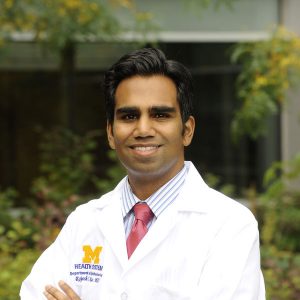 Taubman Emerging Scholar Rajesh C. Rao, M.D., won The American Society for Clinical Investigation’s Young Physician-Scientist Award, which includes an invitation to present his groundbreaking eye cancer research and be recognized at its 2017 Joint Meeting in Chicago April 21-23.
Taubman Emerging Scholar Rajesh C. Rao, M.D., won The American Society for Clinical Investigation’s Young Physician-Scientist Award, which includes an invitation to present his groundbreaking eye cancer research and be recognized at its 2017 Joint Meeting in Chicago April 21-23.
He performed the first systematic genetic study of vitreoretinal lymphoma(VRL). There is currently no treatment to control the disease, a blinding lymphoma with a typical survival rate of three years. Dr. Rao used next-generation sequencing to find several targetable genetic changes, including never-before-identified mutations that promote cancer (oncogenes) and loss in portions of chromosomes that guard against cancer (tumor suppressors).
“The fact that VRL has these changes means drugs already in trials for other cancers might be able to be applied to VRL for the first time,” said Dr. Rao, who collaborated with fellow Taubman Emerging Scholar Scott Tomlins, M.D., Ph.D., an assistant professor of genitourinary pathology, to complete the research.
The prestigious honor recognizes those who are early in their first faculty appointment, are supported by a National Institutes of Health training grant or other similar significant career-development award, and have made such notable research achievements.
“It is a very rare award for someone in my specialty, ophthalmology,” he said. “I feel very fortunate to be selected for this honor.”
University of Michigan’s David Ginsburg, M.D., the James V. Neel Distinguished Professor of Internal Medicine and Human Genetics, nominated Dr. Rao.
“Rajesh is a star,” said Dr. Ginsburg, who is also the Warner-Lambert/Parke-Davis Professor of Medicine and Howard Hughes Medical Institute Investigator. “His work since 1998, from undergraduate to faculty member, reflects a thematic arc: how does epigenetics control differentiation in stem cells and cancer? His original work has provided seminal clues. I am confident Dr. Rao will succeed along this path to translate advances in epigenetics to novel therapies in blindness and cancer.”
Dr. Rao says his ties to the Taubman Medical Research Institute contributed to this recognition. He met Drs. Ginsburg and Tomlins through monthly meetings. “Being part of the Taubman Institute obviously strengthened my application,” he said.
Dr. Rao will receive a $500 honorarium at the ASCI Joint Meeting, in addition to complementary conference and dinner registration. He and Dr. Ginsburg also are invited to the to the ASCI President’s Reception.
Dr. Rao was one of 39 researchers chosen for the honor from a pool of 102 nominees. The ASCI Meeting Committee selected him based on his accomplishments to date and the quality of his proposed abstract.
“It will be a great opportunity to attend the ASCI-AAP Joint Meeting, and meet and network with senior physician-scientist across all specialties,” he said. “My hope is that it will also open up an avenue for collaboration.”





